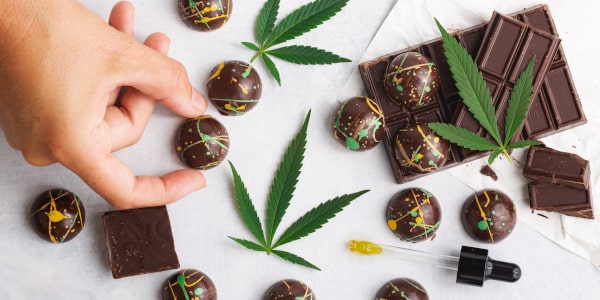UK first in world to regulate CBD novel foods – but global product safety not yet assured

The safety and quality of novel foods containing cannabidiol (CBD) is coming under increased regulatory and scientific scrutiny as the industry continues to expand.
The UK – estimated to be the world’s second largest market for consumer CBD products – became the first country to regulate the market for orally consumed legal cannabis extracts in April. The country’s Food Standards Agency (FSA) released its first list of CBD food products that it believes should stay on the market “pending further consideration” – while others that do not meet the official criteria will be withdrawn from retailers’ shelves.
The publication of the list is the latest stage in a two-year collaboration between the FSA and the CBD trade body ACI (the Association for the Cannabinoid Industry). Last year, the FSA instructed manufacturers and suppliers to apply for authorisation for their CBD extracts, isolates and associated products to be sold in Great Britain.
Under the authorisation process, incorrectly labelled or unsafe products, as well as those containing controlled substances or failing to comply with “other legislative requirements” face being removed from the list. “Any products which do not appear on the list or are marked as ‘Removed’ must be withdrawn from the market,” the FSA guidance adds. It also requires that those applying for authorisation provide detailed scientific evidence to validate the safety of their products, based on guidance from the European Food Safety Agency (EFSA). This recommends that manufacturers’ laboratories, or third -party testing laboratories, submit an analysis of a product’s chemistry and estimate of its exposure to “undesirable substances”, such as contaminants and degradation products. Labs must also assess the item’s allergenicity and toxicology – potentially involving a 90-day oral toxicity study – as well as its pharmacokinetic properties.
The FSA list is regarded as “an essential stepping stone to (products) becoming authorised” in England and Wales, meaning that the foods on the list are regarded as “credible”, subject to satisfying safety assessments before they receive final approval.
“The FSA is not endorsing the sale of these products, regardless of whether they are on the list or not and inclusion is no guarantee of eventual authorisation”, said FSA chief executive Emily Miles. “That will be determined on the strength of evidence of safety submitted by the companies.”

The need for greater regulation of the safety of CBD products was underlined only last month, when a study by the University of Kentucky College of Medicine tested 80 CBD products and found that 52 of them contained traces of intoxicating tetrahydrocannabinol (THC). Some of the products – bought online or in Kentucky retail stores – contained enough THC to potentially intoxicate users, especially if they had no prior experience of the drug.
Report co-author Shanna Babalonis said THC from the 52 contaminated products could also build up in the body and cause individuals such as military personnel, athletes or people in legal disputes to fail drug tests through no fault of their own. She also argued that the study demonstrated the need for stiffer regulation of CBD products in the US.
The Kentucky findings are also consistent with a 2019 study of food-grade CBD products in Germany, which found that around 25% of those analysed contained levels of THC above the lowest observed adverse effects level (2.5 mg/day.) “The safety, efficacy and purity of commercial CBD products is highly questionable,” wrote the study’s authors, “and all of the products in our sample collection showed various non-conformities to European food law.” The German results also echoed those of a case uncovered just a few months prior, in which commercial CBD oil given to an eight-year-old paediatric patient in the US was found to be contaminated with AB-FUBINACA, a dangerous synthetic cannabinoid also known by the street name ‘spice’.
The founder of the ACI, Steve Moore, welcomed increased regulation of the CBD edibles market in the UK, telling New Food Magazine that it would “increase levels of consumer trust, encourage investment in the sector, and promote innovation.” The ACI estimates that the value of the UK CBD consumer products market was £690 million in 2021 – more than double the value that industry experts placed on it just two years earlier. As regulations continue to change, Germany is also forecast to become “one of the world’s most lucrative cannabis markets outside of North America”, where the USA is the world’s biggest buyer of CBD products.
In the new but volatile market of cannabis related products, it is vital that no product slips through the safety cracks. This is where proficiency testing comes into force. By participating in the AXIO Cannabis Scheme, your laboratory can not only manage risk through early warning signs, but you can also have confidence in the measurement of your results.
For 40 years, LGC AXIO Proficiency Testing has been a trusted partner for laboratories working to keep consumer products safe for everyone. Our Cannabis Scheme offers PT solutions for labs that test CBD in food, mycotoxins analysis of cannabis related products, active ingredients in hemp and much more.
Head to lgcstandards.com/AXIO to find out more and place your order.
LGC can also supply a wide range of cannabis-related reference materials from Dr Ehrenstorfer – giving analytical cannabis laboratories a full testing solution.
LGC. Science for a safer world.
|
